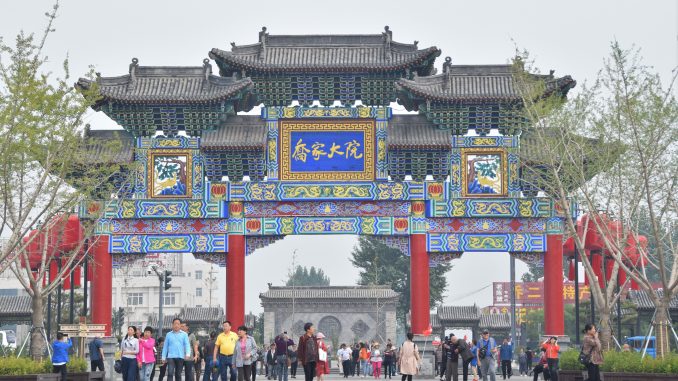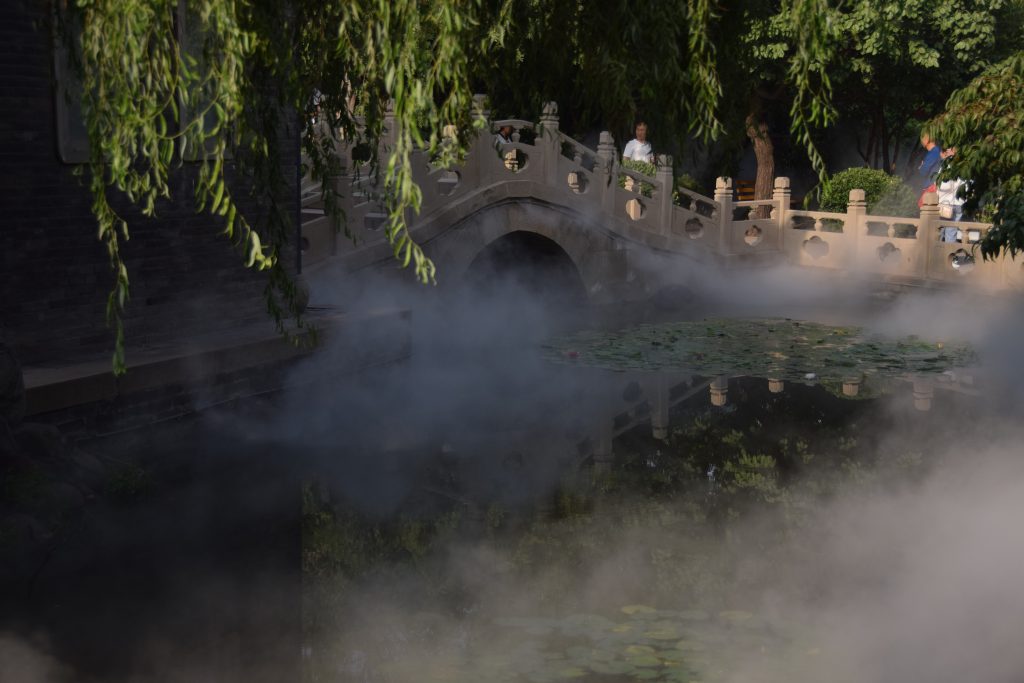
Our luxurious hotel was just about all we get to see of this ‘ancient’ city. Today we head for Pingyao.
I head down for breakfast at six thirty and am disappointed by the variety on offer. I make the best of what there is and when I finish I head up for a second fruit juice. Whilst I had been eating many exciting dishes had been laid out, but I was already full of seaweed. School boy error.
As we head out of the city, on huge, almost deserted motorways, we roll past block after block of towers being constructed for future citizens of this expanding metropolis. ‘If you build it they will come’. Presumably this is for peasants that will be encouraged to leave the fields to work in the city. The scale of it all is hard to comprehend for people from a country where millions is spent on feasibility studies for projects like HS2, the M4 relief road or a new kitchen.
Then, without warning, we find ourselves in another ancient temple. The Jinci Temple dates all the way back to 2007. I am being flippant of course. There is a tree here that is over three thousand years old and there is the oldest jacuzzi in the world, which is actually the source of the river Chin, but it really is difficult to tell which bits are new and which are ancient.
There is a magnificent statue of the founding fathers of China, fearsome looking warriors that have ‘don’t fuck with us’ written all over them (not literally, they just look nails).

We walk past a small stage which we are advised is used as an opera platform. Lucas shows us a video of his friend performing in a Chinese opera. I start to ponder on the musical differences of our cultures. I’m not a fan of European opera, but can appreciate the talent. This is totally alien though. I have no idea if it is talented or not. It is not just the cuisine that and calligraphy that has developed independently of ours. I will never understand their way of writing, their food is exotic and takes getting used to, but one would think music would be the easiest to transcend boundaries, but it’s not. Whether it be opera or pub rock, it’s incomprehensible and on times painful. It sounds like a fire in a pet shop.
We enter one temple where Lucas tells us the story of a woman who did some stuff with water. I don’t remember exactly because I was more interested in the story of the biscuits left at the foot of her statue. How long had they been there, what flavour were they, and would anyone notice if I nicked one? After all, I only had seaweed for breakfast.
We wander a bit more, cross over a bridge and recreate the scene on the willow pattern plates.

We seem to have lost the sun today. It’s still there but the sky is filled with a dusty smog. As we head out of town lone dudes with sweeping brushes can be spotted sweeping the motorway on their own. It is not clear if this is part of a job creation scheme or a way of keeping the population down.
Along the sides of the road new trees are being planted. But not saplings, as we would plant in the UK, mature trees have been uprooted and are being replanted, complete with stays to keep them upright.
Lunch, once again, needs explanation from Lucas. Fortunately, what appeared to be shark fin soup was some sort of bready thing in dish water. The toilets excel themselves. Two open squatters and a urinal in one room. No door. Luckily, no one was taking a shit when I went in.
Just around the corner was our next stop. It had to happen eventually. An ancient site they had not finished building. I say ancient, this time it only dates back to 1756.
The Qiao’s Family Compound, which is used to be the house of a famous local financier during the Qing Dynasty. It is the family home of rich merchants that had made their fortune trading in tofu, camels and swords. And they opened one of China’s first banks. Initially we wander around rooms telling the family’s story.

The site had been used as a setting of a movie telling the story of the family. Like Downton Abbey, Dallas or the Royle family. But soon it morphs into a museum of Chinese life. And there’s lots of it. In case you don’t get bored wandering around, they have extended the historic site with new buildings that, you guessed, are indistinguishable from the old.
In a sneaky variation on the theme, there are gift shops at the beginning, middle and end of the tour.
The site is totally no smoking. But tucked away in the middle is a smoking shed that doubles up as a tobacconists, just in case you were not mug enough to be caught by the gift shops.

I hope this does not come over as cynical. We had a great time.
Our expedition continues south. We eat up the miles by heading down a wide dusty road flanked on either side by corn fields that stretch off beyond the edge of the fog. It becomes clear that the traditional UK overtaking technique of ‘mirrors, signal manoeuvre’ has been replaced in the Chinese version of the highway code with ‘manoeuvre, beep your horn and if anything is coming the other way, beep louder’.
Soon we are entering the ancient city of Pingyao. And this time – wait for it – it is very old. The town is first recorded c. 800 BC and has been the seat of local government since at least the Qin. By the 16th century, it was a regional financial hub; some consider it to have been the financial centre of the Qing Empire in the late 19th century.
I’m not sure how ‘ancient’ the current city centre is, I suppose you could call it the ‘little boy who cried ancient’ syndrome. But this time it feels authentic. The city is so old, we can’t drive within the city walls so we have to decant ourselves and our bags into little golf cart type buggy things for a short drive through the ancient alleys.

All the buildings are single storey and we zip past an assortment of shops, restaurants and bars. Yes, you read it right, bars.
Eventually we have to pile out of our buggy because our hotel is smack in the middle of town where not even our turbocharged golf carts are allowed.
I’m not sure how authentic this place is but it certainly feels more organic. We are smack in the middle of what could best be described as Camden market. Ok, I know Camden market is not particularly authentic, but it’s ten times better than an identikit shopping centre. (I refuse to use the word ‘mall’. Oops. I said ‘mall’).
We walk straight into a small area that doubles up as a reception, dining room and bar. Yes. Bar.
After picking up our key – a proper old school key, none of your card key nonsense, the type that fits in the padlock on our door – we head through a beautiful rustic courtyard full of potted plants and climb the stairs to our rooms. And I mean climb. They are like the stairs leading up to the temple on the side of the mountain.

Once our bags are dumped we head for – you guessed- the bar. Beers are drunk, omelettes are eaten and shit is talked till it’s time to, literally, climb the wooden ladder.